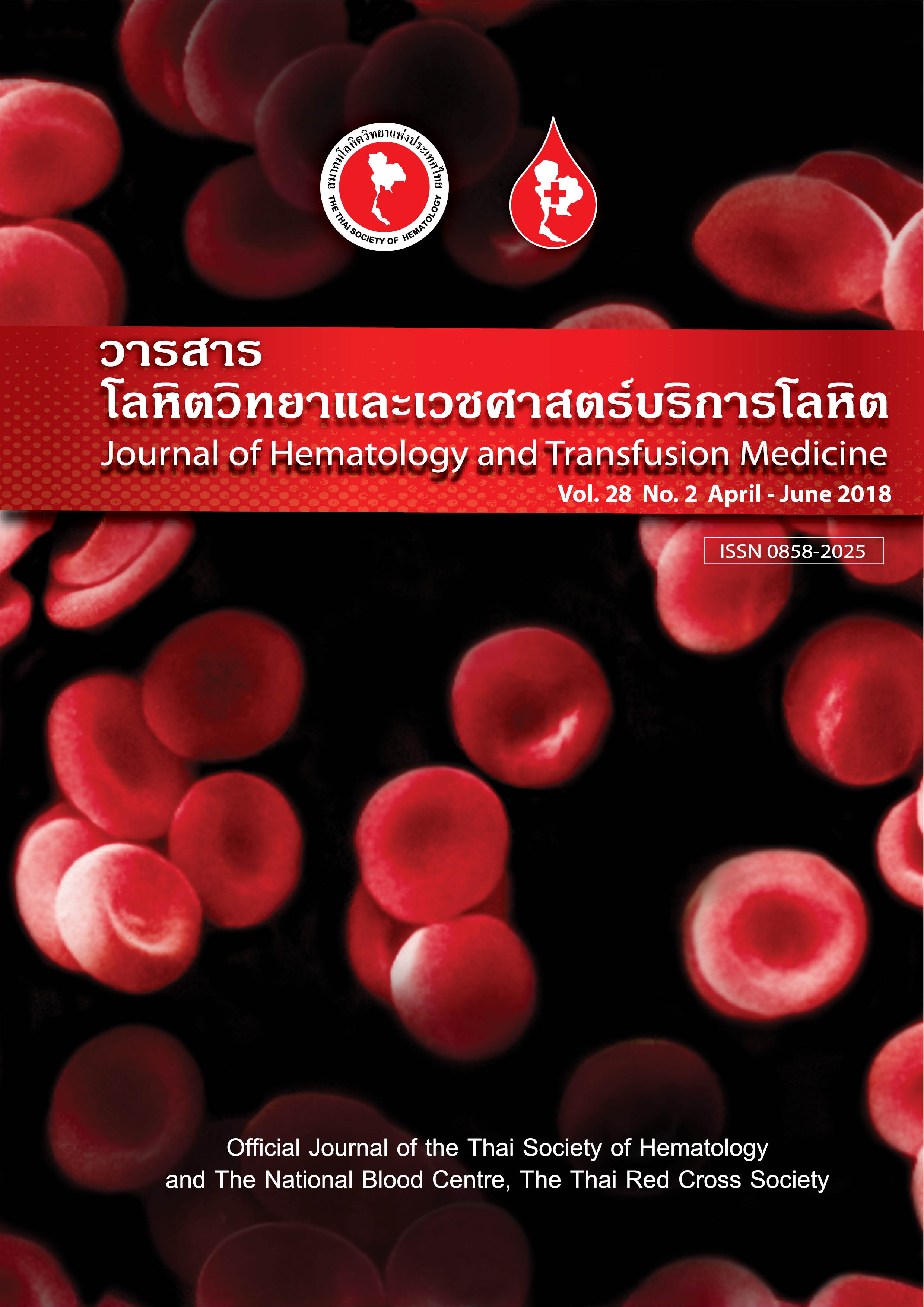ความหลากหลายทางพันธุกรรมของยีนทรานส์ฟอร์มมิงโกรทแฟคเตอร์เบตากับผลลัพธ์ของการติดเชื้อไวรัสตับอักเสบบี
คำสำคัญ:
polymorphism, cytokine, Transforming growth factor-β, Hepatitis B virusบทคัดย่อ
บทคัดย่อ
บทนำ ไวรัสตับอักเสบบีทำให้เกิดอาการตับอักเสบชนิดเฉียบพลันและเรื้อรังพบได้ทั่วโลก การตอบสนองทางภูมิคุ้มกันของร่างกายในการกำจัดเชื้อไวรัสตับอักเสบบีนั้นต้องอาศัยไซโตไคน์เป็นสื่อกลางในการกระตุ้นและยับยั้งเซลล์ในระบบภูมิคุ้มกัน ทรานส์ฟอร์มมิงโกรทแฟคเตอร์เบตา (TGF-β) เป็นไซโตไคน์ที่มีบทบาทในการควบคุมการตอบสนองทางภูมิคุ้มกันของร่างกายและยับยั้งการอักเสบ มีการรายงานว่าความหลากหลายทางพันธุกรรมของยีน TGF-β มีผลต่อระดับการสร้าง TGF-β ส่งผลต่อระบบภูมิคุ้มกันทำให้เกิดผลลัพธ์ของการติดเชื้อไวรัสตับอักเสบบีที่ต่างกัน วัตถุประสงค์ เพื่อวิเคราะห์ความสัมพันธ์ระหว่างความหลากหลายทางพันธุกรรมของยีน TGF-β กับผลลัพธ์ของการติดเชื้อไวรัสตับอักเสบบี วัสดุและวิธีการ วิเคราะห์หาความหลากหลายทางพันธุกรรมของยีน TGF-β ในตำแหน่ง -509 (T/C) และ +869 (T/C) ด้วยวิธี polymerase chain reaction-sequence specific primer (PCR-SSP) ในเลือดผู้บริจาคโลหิตจำนวน 304 ราย แบ่งเป็น (1) ผู้ที่ไม่เคยติดเชื้อไวรัสตับอักเสบบี จำนวน 99 ราย (2) ผู้ที่เคยติดเชื้อไวรัสตับอักเสบบีและมีภูมิคุ้มกันแล้ว จำนวน 110 ราย และ (3) ผู้ที่ติดเชื้อไวรัสตับอักเสบบีเรื้อรังจำนวน 95 ราย ผลการศึกษา พบตำแหน่ง -509 (T/C) มีการกระจายความถี่ genotype TT, TC และ CC ในกลุ่ม (1) ร้อยละ 29.9, 55.7 และ 14.4 ตามลำดับ กลุ่ม (2) ร้อยละ 26.4, 54.5 และ 19.1 ตามลำดับและกลุ่ม (3) ร้อยละ 34.1, 51.1 และ 14.8 ตามลำดับ ในตำแหน่ง +869 (T/C) มีการกระจายความถี่ genotype TT, TC และ CC ในกลุ่ม (1) ร้อยละ 35.2, 54.9 และ 9.9 ตามลำดับ กลุ่ม (2) ร้อยละ 32.5, 57.1 และ 10.4 ตามลำดับ และกลุ่ม (3) ร้อยละ 31.8, 56.8 และ 11.4 ตามลำดับ และพบการกระจายความถี่ของ haplotype ทั้งสามกลุ่มตัวอย่างแตกต่างกันอย่างมีนัยสำคัญทางสถิติ (p < 0.001) และ haplotype CC พบความถี่สูงในกลุ่ม (2) และ (3) เมื่อเทียบกับกลุ่ม (1) สรุป ความหลากหลายทางพันธุกรรมของยีน TGF-β (-509/+869) มีความสัมพันธ์กับการติดเชื้อไวรัสตับอักเสบบี โดย haplotype CC เป็นชนิดที่ลดการสังเคราะห์ไซโตไคน์นี้พบว่ามีความสัมพันธ์แบบเพิ่มความเสี่ยงต่อการติดเชื้อไวรัสตับอักเสบบี
Abstract:
Background: Hepatitis B virus (HBV) causes acute and chronic hepatitis worldwide. Immune response in limiting HBV infection requires cytokines-mediated stimulation and inhibition of immune cells. Transforming growth factor-β (TGF-β) plays a role in regulating the immune response and inhibits inflammation. Previous study reported that TGF-β gene polymorphisms affected the different level of TGF-β production that lead to the different outcomes of HBV infection. Objective: To investigate the association of TGF-β gene polymorphisms with the outcomes of hepatitis B virus infections. Materials and Methods: TGF-β gene polymorphisms at -509 (T/C) and +869 (T/C) were determined by polymerase chain reaction-sequence specific primer (PCR-SSP) in 304 donating blood samples. Subjects consisted of 3 groups as I) Naïve HBV group who do not get HBV infection (n=99), II) HBV recovery group who recovered from HBV infections with immunity (n=110 cases), and III) Chronic HBV group who has HBV persistence infection (n=95). Results: The detective rate of TT, TC and CC genotype at -509 (T/C) in group (I) were 29.9%, 55.7% and 14.4 %, respectively; in group (II) 26.4%, 54.5% and 19.1%, respectively; and group (III) 34.1%, 51.1% and 14.8%, respectively. Rate of TT, TC and CC genotype at +869 (T/C) in group (I) were 35.2%, 54.9% c and 9.9 %, respectively; group (II) 32.5%, 57.1% and 10.4%, respectively; and group (III) 31.8%, 56.8% and 11.4% respectively. The frequency distributions of haplotypes in three groups were significantly different (p < 0.001). The frequencies of CC haplotype in group (II) and (III) were higher than group (I). Conclusion: Polymorphisms of TGF-b (-509/+869) were associated with HBV infections. The CC haplotype, decreased this cytokine production, was associated with increased risk of HBV infections.



